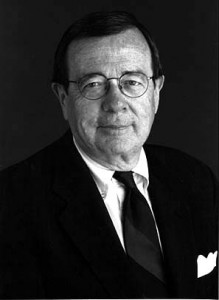This post is part of The Plank Center’s Legacies from Legends in PR Series that was begun in recognition of the 40th Anniversary of the Public Relations Student Society of America in 2007.
Serves as senior counsel at Ketchum. Specializes in reputation management and corporate responsibility. Co-chair of The Commission on Public Relations Education; liaison to the United Nations for PRSA; Ambassador-at-Large for the Global Alliance for Public Relations and Communication Management; member of the Accrediting Council on Education in Journalism and Mass Communications. Recipient of PRSA’s Gold Anvil Award (1994), Ferguson Award (2000) and Patrick Jackson Award (2002).
A profession must have a basic, defining social purpose. Medicine has health. Law has order. And public relations has harmony. I heard that statement at a Public Relations Society of America conference many years ago, and it’s been at the root of many of my professional experiences since then–some of which I’ve participated in, others I’ve observed with great interest.
Now, some will say that harmony is a naive or arrogant goal for our profession. To them, I say think again. Harmony, after all, comes in many sizes. In today’s vernacular it’s “scalable” (but in reverse). And it comes in many forms–joining marketer to customer, shareholder to company directors, management to employees, corporation to society and, yes, a nation to the global community.
If harmony, or something very much like it – mutual understanding, common interest, cooperation or a transaction – is our ultimate calling, we’re in an enviable position to help our organizations achieve it. Because effective public relations operates at the interface of the organization and society. That means gathering and interpreting ever-changing public expectations and demands, influencing policy and performance and articulating the organization’s decisions and offerings.
That may sound grandiose at the entry-level when you’re writing a new product release or staffing a special event. It’s not. Because even at that level and in those assignments, the task is to explore and develop common interests.
Furthermore, in public relations, we have a powerful weapon in this task: language. Think about playwright Tom Stoppard’s’ profound observation about the potential impact of words: “Words are sacred. They deserve respect. If you get the right ones in the right order, you can nudge he world a little…”
Nudge the world a little. How’s that for a life’s work? Nudge it toward what? Obviously, toward harmony that contributes to an improved quality of life and a higher standard of living. And make no mistake, every little “nudge” in that direction – a new product or service, public policy in the common interest or simply empathetic dialogue – can make an incremental contribution.
You will, of course, encounter cynics. Some will say that “The world is going to hell in a hand basket.” The temptation is to despair; terrorism, regional wars, economic inequality, disease and the threat of ecological disaster all point in that direction.
But the counter-argument is powerful. Author Robert Wright has given us perhaps the most thoughtful analysis of the long upward arrow of human history. He tells us that despite many setbacks, “It is hard, after pondering the full sweep of history, to resist the conclusion that – in some important ways, at least – the world now stands at its moral zenith to date.”
And Wright poses this seminal question: “Given the centrality of information technology…is it possible that we are passing through a true threshold, a change as basic as the transition from hunter-gatherer village to chiefdom, from chiefdom to ancient state?”
This may well be the world that my generation is leaving for you, public relations students. Clearly, today’s members of PRSSA will be practicing public relations in a very changed world in the decades ahead. If you’re to be successful in that ever-changing world, you must not shrink from such “big think” questions.
With such exciting prospects for our profession, I can’t help but I wish I were starting all over again in public relations.
Published: 2007
More from John Paluszek:
